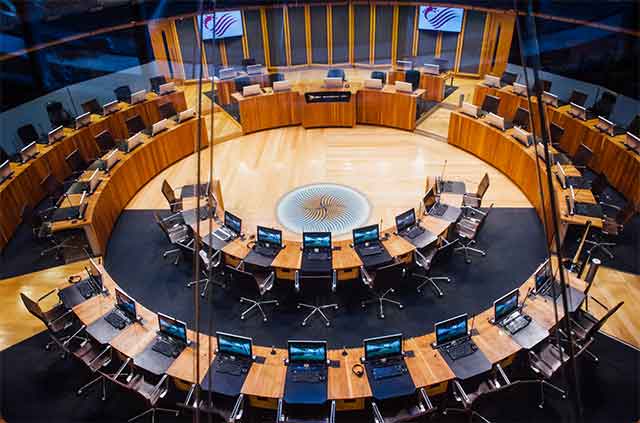Tribunals in Wales do not have the necessary resources to make sure cases are dealt with quickly, efficiently and justly, a committee heard.
Gary Hickinbottom, who is president of the Welsh Tribunals, which oversees seven devolved tribunals, appeared before the Senedd’s legislation committee on October 14.
Labour’s Mike Hedges, who chairs the legislation committee, questioned a combined budget overspend of more than £1m over the past two financial years.
Sir Gary told the committee: “One significant factor is general inflation, particularly in terms of pay and pension payments, and that inflation has not been reflected in the budget.”
Pressed on whether tribunals have the required resources and support to ensure cases are disposed of speedily, efficiently and justly, he said: “I think the real answer is ‘no’.”
‘Disparity’
He raised concerns about a disparity between the Welsh tribunal budget and actual spending, saying future estimates must more accurately reflect likely expenditure.
Giving evidence on his annual report, his first since being appointed in May 2023, Sir Gary raised the risk of ‘stark’ differences in pay between devolved and non-devolved tribunals.
The former appeal court judge warned any disparity in pay, terms and conditions, training or opportunities could lead people towards non-devolved tribunals.
He said: “Things like rates of pay are more important … than they once were. That’s not to say that judicial office holders are not driven by public service.”
Sir Gary told the committee there was parity of pay rates between devolved and non-devolved tribunals until 2023/24.
‘Deficiency’
But he warned: “Last year, there was a disparity in the pay award because the Welsh Government did not make an award in line with the senior salaries review body recommendations which the UK Government did.
“So, there was a 2% deficiency in Wales compared with the reserved courts and tribunals.
“One understands the financial pressures on the Welsh Government that resulted in that disparity but I’m pleased to say that disparity has now gone.”
Sir Gary added: “That, I think, is very important. It’s not simply the cash, although for some people that’s important – it’s also a mark of the perceived value.”
He warned historical pay differences for non-sitting days remain, and in all cases “there’s disparity against the devolved tribunals in favour of the reserved tribunals”.
‘Jagged edge’
Labour’s Alun Davies asked about proposals for structural reform, which include creating a first-tier tribunal divided into chambers and an appeal tribunal for Wales.
Sir Gary said Welsh tribunals are in a peculiar place on the “jagged edge” of devolution, with the justice system reserved to Westminster
He told the committee: “[It’s] really important that these reforms go through, I think – both for the tribunals themselves but particularly, of course, for the tribunal users.
“We’re all here to serve the people of Wales.”
Describing the plans as balanced and coherent, he said: “The scope of the newly reformed tribunals will expand to include things like school admissions and school exclusion appeals.”
Sir Gary told committee members the reforms would “future proof” the system, with scope to bring further devolved areas such as youth justice under the umbrella.

